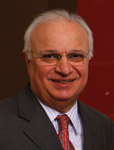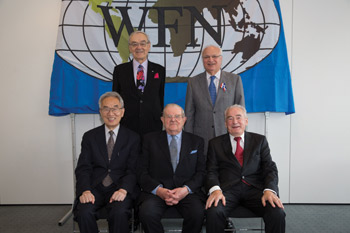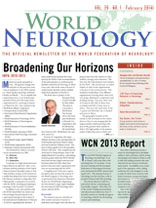By Raad Shakir

Raad Shakir
It is an honor to write to you as the 10th president of the WFN. I follow a long and distinguished line of presidents over the past 56 years. Each president has complemented and strengthened the work of his predecessor and added his own touch to maintain the upward curve of our federation and carry on the torch of neurology. Our history is indeed illustrious and glorious thanks to their achievements. It was a great opportunity to have four previous presidents join me in Vienna. (See photo on page 14.) Unfortunately, James Toole was unable to join us. The contributions and wisdom of all of our presidents will be our guide for the future.
Our predecessors have laid out the path. As president, I will move full speed ahead with determination to carry out the tasks entrusted to me and to all the trustees. The newly elected officers — William Carroll (Australia) as first vice president and Wolfgang Grisold (Austria) secretary-treasurer general — have vast experience and the zeal to work. Gallo Diop (Senegal) is the first sub-Saharan African trustee, and he will add another dimension to the group.
Since my first involvement with the WFN over 33 years ago, I have learned that the way to make progress is to bring neurologists together, and to respond to their requests to be put in touch with colleagues. In an electronic world, communication is instantaneous and those with ideas may be anywhere in that world. To provide access to others with similar interests but who perhaps live in communities where the technology and financial support is different is what the WFN is all about.
My task and that of my fellow trustees is huge and daunting. As I said in my election statement, my plan is to involve all societies and their members in our activities. This will need openness and transparency to achieve inclusivity and collaboration. Transparency of our decisions is vital and will be adhered to in the years to come. As new trustees, our plan of action will be formulated in the first year of office, and we will fulfill our responsibilities with the diligence that the Council of Delegates expects of us. At least for me, and I hope for the WFN, the elections in Vienna were a turning point toward Global Involvement Through Regional Empowerment. This in my opinion is crucial for the future success of the WFN.
We now live in a world of change both in our scientific understanding of our speciality and the need for cooperation between all our six regions. Many will need to interact closely with each other for advancement of their scientific progress, education, training and provision of care to patients. This needs an organizer, a go-between, a fixer, and the WFN can and should be all of that.

Front Row (L-R): Jun Kimura (2002-2005); Lord Walton of Detchant (1990-1997); Johan Aarli (2006-2009) Back Row (L-R): Vladimir Hachinski (2010-2013); Raad Shakir (2014-2017)
Collaboration through WFN member societies is possible because we all have the ability to help each other and strong reasons to do so. Moreover, our neurology specialty associations are also strong and willing to participate. This is the way forward.
The newly elected trustees started work in earnest in January by holding a first meeting at the headquarters in London. It brought together the regional directors and chairs of initiatives, and will culminate in the reconfiguration of our committees. The work will begin immediately. I think that the outcome will determine our future for the next four years. I am under no illusion about the seriousness of the task ahead but with widespread advice and participation, I am confident we will identify the priorities for the future.
The WFN is but one of the organizations necessary to achieve these goals. It will do its best to be the catalyst and listen to all stakeholders. We have inherited a wonderful set-up from all our predecessors, and we should rise to the challenge to harness our legacy and add as much as we can with everyone’s support.
As secretary-treasurer general for the last seven years, I have learned that change is important and necessary, but in order to be implemented successfully it has to have relevance and be introduced with the agreement of the stakeholders. This will be possible with the involvement of all our members. The new trustees have made clear commitments in their manifestos, which were clearly endorsed by the Council of Delegates. We will all work, consult, have our different points of view and then come to the appropriate collective conclusions. We will all work hard to justify the trust placed in us.
